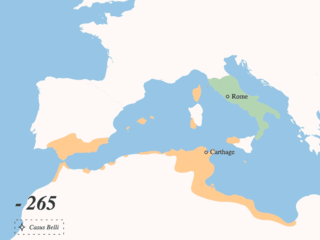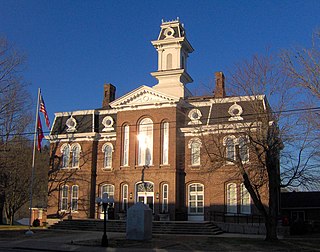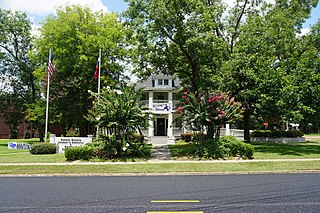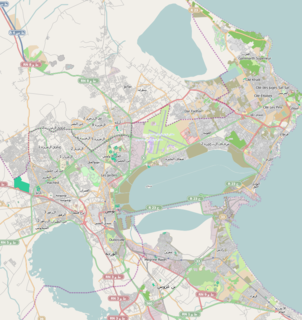
Carthage was the center or capital city of the ancient Carthaginian civilization, on the eastern side of the Lake of Tunis in what is now the Tunis Governorate in Tunisia.

The First Punic War was the first of three wars fought between Ancient Carthage and the Roman Republic, the two great powers of the Western Mediterranean. For 23 years, in the longest continuous conflict and greatest naval war of antiquity, the two powers struggled for supremacy, primarily on the Mediterranean island of Sicily and its surrounding waters, and also in North Africa.

The Punic Wars were a series of three wars fought between Rome and Carthage from 264 BC to 146 BC. At the time, they were some of the largest wars that had ever taken place. The term Punic comes from the Latin word Punicus, meaning "Carthaginian", with reference to the Carthaginians' Phoenician ancestry.

The Third Punic War was the third and last of the Punic Wars fought between the former Phoenician colony of Carthage and the Roman Republic. The Punic Wars were named because of the Roman name for Carthaginians: Punici, or Poenici.

Dido was, according to ancient Greek and Roman sources, the founder and first queen of Carthage. She is primarily known from the account given by the Roman poet Virgil in his epic, Aeneid. In some sources she is also known as Elissa.

Carthage is a city in Hancock County, Illinois, United States. The population was 2,605 as of the 2010 census, down from 2,725 in 2000. It is the county seat of Hancock County. Carthage is best known for being the site of the 1844 murder of Joseph Smith, founder of the Latter Day Saint movement.

Carthage is a city in Jasper County, Missouri, United States. The population was 14,378 at the 2010 census. It is the county seat of Jasper County and is nicknamed "America's Maple Leaf City."

Carthage is a town in and the county seat of Smith County, Tennessee, United States; it is part of the Nashville Metropolitan Statistical Area. The population was 2,306 at the 2010 census. It is located on the Cumberland River, which was important to its early development. It is likely best known as the hometown of former Vice President and Senator Al Gore of the Democratic Party and his father, Senator Albert Gore, Sr. The younger Gore announced his 1988 and 2000 presidential bids, as well as his 1992 vice-presidential bid, from the steps of the Smith County Courthouse.

Carthage is a city in Panola County, Texas, United States. This city is 150 miles southeast of Dallas. The population was 6,779 at the 2010 census. It is the county seat of Panola County, and is situated in East Texas near the Louisiana state line.

Carthage College is a four-year private liberal arts college affiliated with the Evangelical Lutheran Church in America. Situated in Kenosha, Wisconsin, midway between Chicago, Illinois, and Milwaukee, Wisconsin, the campus is an 80-acre arboretum on the shore of Lake Michigan and is home to 3,000 full-time and 200 part-time students.

U.S. Route 79 is a United States highway. The route is officially considered and labeled as a north-south highway, but it is actually more of a diagonal northeast-southwest highway. The highway's northern/eastern terminus is in Russellville, Kentucky, at an intersection with U.S. Highway 68 and KY 80. Its southern/western terminus is in Round Rock, Texas, at an intersection with Interstate 35, ten miles (16 km) north of Austin.

The Councils of Carthage, or Synods of Carthage, were church synods held during the 3rd, 4th, and 5th centuries in the city of Carthage in Africa. The most important of these are described below.

Fountain Green is an unincorporated community located about eleven miles northeast of Carthage, Illinois, United States in Fountain Green Township, Hancock County, Illinois.
Leggett & Platt (L&P), based in Carthage, Missouri, is a diversified manufacturer that designs and produces various engineered components and products. The firm was founded in 1883, and consists of 15 business units, 23,000 employee-partners, and 145 manufacturing facilities located in 18 countries.
William Cullom was an American politician and a member of the United States House of Representatives.

The Punics, also known as Carthaginians, were a people from Ancient Carthage who traced their origins to the Phoenicians. Punic is the English adjective, derived from the Latin adjective punicus to describe anything Carthaginian. Their language, Punic, was a dialect of Phoenician.

Carthage was founded in the 9th century BC on the coast of Northwest Africa, in what is now Tunisia. It developed into a significant trading empire throughout the Mediterranean, and was seen as home to a wealthy and brilliant civilization. After a long conflict with the emerging civilization of Ancient Rome, known as the Punic Wars, during which advantage shifted from one side to the other and Hannibal conducted a campaign in Italy after first crossing the Alps, Rome finally destroyed Carthage in 146 B.C. A Roman Carthage was established on the ruins of the first.

Carthage was a Phoenician state that included, during the 7th–3rd centuries BC, its wider sphere of influence known as the Carthaginian Empire. The empire extended over much of the coast of Northwest Africa as well as encompassing substantial parts of coastal Iberia and the islands of the western Mediterranean Sea.
Logan House may refer to:

Carthage is a commune in Tunis Governorate, Tunisia. It is named for, and includes in its area, the archaeological site of Carthage.





















